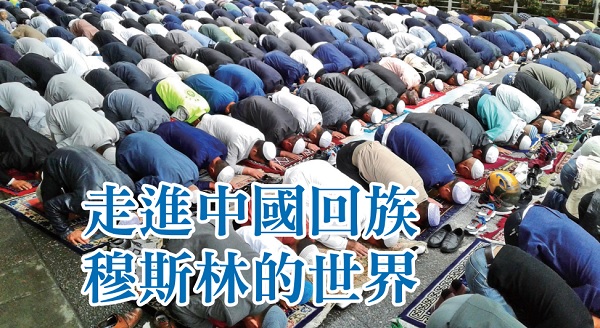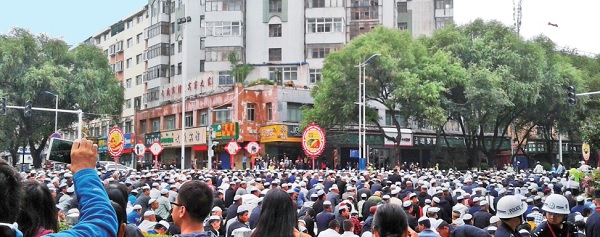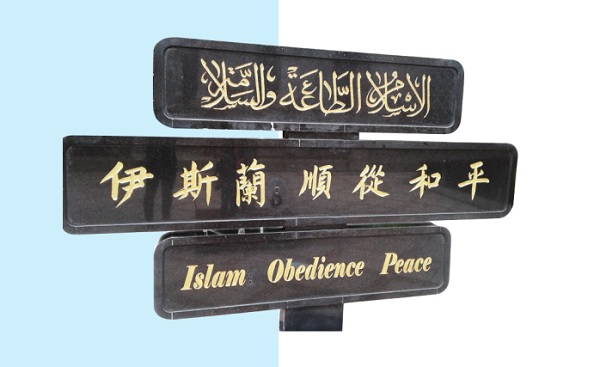Entering the world of Hui Muslims in China
【I love "Mu" more and more】
Photo courtesy/Wang Shouxin

▲On the annual Eid al-Adha festival, hundreds of thousands of Hui Muslims worship together.

▲During the Eid al-Adha ceremony, women and tourists could only watch from the sidelines, and police officers were deployed to maintain order.
When you think of Hui Muslims in China, what comes to your mind? The man with a yellow face and a white cap? A woman wearing a headscarf and a black robe? A group of Hui people who don’t eat pork?
During a ten-day trip, I was able to get close to Hui Muslim friends, and I was surprised to find that they upheld the hospitality of the Old Testament and desert culture, and believed very much in the story of Abraham (called Ibrahim in the Quran) and "someone who receives hospitality" The honorary tradition of "a traveler, actually received an angel", the level of hospitality was beyond my surprise.
A brief introduction to Hui Muslims in China
The Hui people are the most widely distributed ethnic minority in China, and they have mosques in all areas where they live. The development of the Hui people in China can be divided into three waves. The first wave began in the Tang Dynasty in the mid-seventh century. A large number of Persian and Arab merchants came to settle on China's coast and inland via sea and land. The second wave began in the 13th century and developed most prosperously. As the Mongolian army brought back a large number of Central Asians from their western expeditions, they absorbed elements of Han, Mongolian, Uyghur and other ethnic groups and gradually formed the Hui ethnic group with their own unique style. The third wave began in the early Ming Dynasty and began to intermarry with the Han people. However, in the late Qing Dynasty, riots broke out and were suppressed by Zuo Zongtang's troops. More than one million people were killed and injured. There was no longer harmony between the Han and Hui people. During the Republic of China, Sun Yat-sen, the founding father of the country, proposed the concept of "republic of the five ethnic groups" in governing the country.
The formation and development of the Hui people in China have been strongly influenced by traditional Islamic cultures such as Arabia and Persia. In the past, the common name "Muslims" refers to the Hui people who believe in Islam; but nowadays, China rarely uses the term "Muslims" and all Hui people who believe in Islam are called "Muslims".
China has a Muslim population of approximately 10 to 20 million. Among the 56 ethnic minorities, the Hui, Uyghur, Kazakh, Uzbek, Tajik, Tatar, Salar, Dongxiang, and Baoan ethnic groups believe in Islam. The main areas where Muslims live are in Xinjiang Uygur Autonomous Region, Ningxia Hui Autonomous Region, Gansu, Qinghai and Yunnan.

▲A sign outside the mosque.
Five pillars of Islam
Chinese Islam has a long history of 1,300 years and rich cultural heritage. During this trip, I asked for advice on the five major practices of Islam: "recitation, etiquette, fasting, teaching, and paying homage," or "the five practices."
1. Mindfulness:
It refers to reciting the Quran, mainly reciting the Shahada, that is, "There is no god but God; Muhammad is the messenger of God." Every Muslim must be able to read this sentence in Arabic.
2. Rituals:
That is "worship". According to the prescribed time and procedure, worship God Allah facing the Kaaba (Kaaba) in Mecca, the holy land. There are five prayers every day: morning prayer, ring prayer, mid-afternoon prayer, evening prayer, and evening prayer. The largest crowd of the week is the Friday noon prayer at the mosque.
One day at noon, I was dining in a halal restaurant and chatting with the boss. The boss suddenly said: "It's time, I'm going to pray!" After that, he took off his apron and left without caring whether I gave him the money for the meal. I put the meal money on the table and followed him to the mosque to have a look.
When we arrived at the mosque, we saw groups of Muslim men wearing white hats, walking from east to west, north to south, and several of them came on motorcycles. This small mosque has a history of more than a hundred years. When they met, they clasped hands and greeted each other. When the announcement of the church service rang, they took off their shoes in an orderly manner and walked quietly into the lobby. I am a foreigner and cannot enter. An old man told me that I could sit quietly in the yard and watch the ceremony. The service lasts approximately 20 minutes. I noticed a modern electronic clock hanging on the wall with the detailed times for the five prayers.
3. Zhai Gong:
Every year in September of the lunar year in the Islamic calendar, they fast for a month and prohibit eating, drinking, entertainment and other activities from sunrise to sunset, except for young children, patients and pregnant and lactating women. Eid al-Fitr, a month after fasting, is celebrated enthusiastically, which is equivalent to the Spring Festival for the Han people. The two biggest festivals of the year are Eid al-Fitr and Eid al-Adha.
Eid al-Adha, also known as Eid al-Adha, comes from the story of Abraham sacrificing his son. But after some inquiries, I found that most Muslims do not know the meaning behind the Eid al-Adha festival. They only know that this ritual, which has been passed down for more than a thousand years, is to relieve poverty. 1/3 of the meat from the slaughter is shared with relatives and friends, 1/3 is given to the poor, and 1/3 is given to the mosque.
I came here mainly to watch the Eid al-Adha festival and saw hundreds of thousands of Muslim men (only men are allowed to participate) lined up neatly on an avenue next to the mosque. It was very spectacular. Each person spread a small blanket on the ground and performed different worship rituals and actions according to the broadcast. A large number of tourists and some Muslim women stood on the roadside to watch, and there were also a large number of armed policemen maintaining order.
4. Lessonwork:
That is, Zakat, which is regarded as a religious tax "determined by the command of the Lord." According to Islamic rules, Muslims must liquidate their property every year. In addition to normal expenses, 1/40 of their surplus property must be taxed at different rates.
5. Contribution to court:
Mecca is the birthplace of Muhammad, the cradle and holy land of Islam. All Muslims, regardless of gender, who are in good health and have financial conditions permitting, must go to Mecca at least once in their lives to perform Hajj. Upon completion, they will receive the honorary title of "Haji" . A new Muslim friend I met told me that after his uncle returned from a pilgrimage to Mecca, his life really changed. He no longer criticized people behind their backs, was not greedy for wealth, and believed more seriously.
This makes me very curious and admired. Think about it. As Christians, after we believe in the Lord, do our words, deeds and life match the grace we have been called to?

▲View from the mountains the villages where Muslims gather.
Talking about the Gospel with Hui Muslims
When traveling, I like to talk to different Muslim friends and learn about their lives, culture, and beliefs. An unwritten rule when talking to Muslims is that men should only talk to men, and it is not appropriate for strangers to talk to Muslim women.
One day, I walked into an alley and was in a hurry. I asked an old man who came out to take out the trash where there was a public toilet. He said there were no public toilets nearby. A few seconds later, he took the initiative to invite me to use the toilet at his home. Afterwards, he served me tea and steamed buns (a Hui food, similar to flatbreads). He is a retired railway engineer who reads a volume of the Quran every day. Two hours have passed since this conversation. If I didn't take the initiative to get up, I'm afraid he would keep me down for dinner.
Chatting is chatting, but ultimately we have to talk about the gospel with the old man. I asked him if he admitted that he was a sinner? He said no because he had followed the teachings of God all his life. I asked him again if he had lied? He said that he never lied to his family, but he did lie to outsiders out of a position of protecting himself. I asked him again, do you have assurance of eternal life? He said that no one can guarantee eternal life, and he can only try his best to abide by the religious rules.
I shared with him that I knew that I was a sinner and that no matter how hard I tried, I could never meet God’s standards on my own. However, Jesus paid the penalty for our sins so that we could be reconciled to God.
In a short period of time, I knew that I could not change the old man's belief, because in Islamic teachings, Jesus (Isa) is a prophet, not God. But I wanted him to know that I was a follower of Jesus and had assurance of eternal life.
On the return flight, there happened to be another Hui Muslim sitting next to me. My Chinese-American identity made him interested in me. He has been to Taiwan for sightseeing and is an intellectual. We had a great time chatting, about everything from travel to children's education. We also exchanged my observations on Muslims during the ten-day trip and took the initiative to ask him about his views on Christianity. In the last half hour, I revealed that I was a Christian and he said that he had actually guessed it. I asked him for his phone number and said that I might visit the old place again in a year or two.
Throughout the ages, the pattern of human beings trying to save themselves by good deeds has always been repeated over and over again; people always think that God is out of reach, and they must rely on their own efforts to obtain God's blessings. Only when Jesus returns will all the world's problems be solved. However, “the gospel of the kingdom will be preached in the whole world as a witness to all nations, and then the end will come.” (Matthew 24:14) There are still many people in this world who do not know Jesus at all, or have even heard of Jesus. A missionary who has lived in a Muslim tribe for many years said: Why Muslims are hard ground for the gospel is because there are very few people who have preached the gospel to them for thousands of years.
It is indeed not easy to leave your family, friends, comfortable environment, work, and everything else to preach the gospel among Muslims. As I write this article, I am still waiting for God’s will and I don’t know when I will return to being a Muslim again. I look forward to having the opportunity to visit the old people in the alley again and to call the young people I met on the plane. I want to tell them: "It was Jesus who loved me first, so I love you too."
Wang Shouxin (pseudonym) is from Taiwan and studied at the Chinese Evangelical Theological Seminary in North America. He has a burden for Mu Xuan and is facing a choice in the second half of his life.
